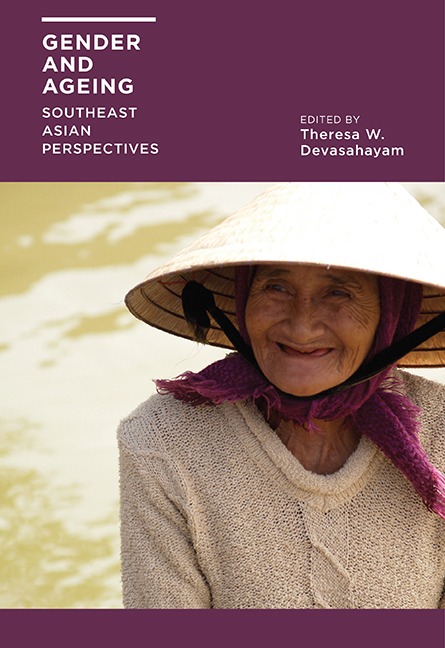Book contents
- Frontmatter
- Contents
- List of Tables and Figures
- Acknowledgments
- Contributors
- 1 Growing Old in Southeast Asia: What Do We Know about Gender?
- 2 Gender and Ageing in Thailand: A Situation Analysis of Older Women and Men
- 3 Gender and Well-being of Older Persons in Cambodia
- 4 Preparations for Old Age and Social Participation of Present and Future Older Persons in Thailand: Gender Difference
- 5 Gender and Health Status among Older Adults in Vietnam
- 6 Ageing and Gender Preferences in Rural Indonesia
- 7 Exploring the Experiences of Older Men and Women in Caregiving and Care-receiving in Sarawak, Malaysia
- 8 An “Active Ageing” Approach to Living Alone: Older Men and Women Living in Rental Flats in Singapore
- 9 Ethnic Patterns and Styles of Active Ageing among Widows and Widowers in Singapore
- 10 Employment Patterns of Older Women in Indonesia
- 11 Gender Differentials in Work and Income among Older Malaysians
- 12 Gender and Economic Well-being among Older Filipinos
- 13 Work, Retirement and the Gender Divide in the Philippines
- Index
7 - Exploring the Experiences of Older Men and Women in Caregiving and Care-receiving in Sarawak, Malaysia
Published online by Cambridge University Press: 21 October 2015
- Frontmatter
- Contents
- List of Tables and Figures
- Acknowledgments
- Contributors
- 1 Growing Old in Southeast Asia: What Do We Know about Gender?
- 2 Gender and Ageing in Thailand: A Situation Analysis of Older Women and Men
- 3 Gender and Well-being of Older Persons in Cambodia
- 4 Preparations for Old Age and Social Participation of Present and Future Older Persons in Thailand: Gender Difference
- 5 Gender and Health Status among Older Adults in Vietnam
- 6 Ageing and Gender Preferences in Rural Indonesia
- 7 Exploring the Experiences of Older Men and Women in Caregiving and Care-receiving in Sarawak, Malaysia
- 8 An “Active Ageing” Approach to Living Alone: Older Men and Women Living in Rental Flats in Singapore
- 9 Ethnic Patterns and Styles of Active Ageing among Widows and Widowers in Singapore
- 10 Employment Patterns of Older Women in Indonesia
- 11 Gender Differentials in Work and Income among Older Malaysians
- 12 Gender and Economic Well-being among Older Filipinos
- 13 Work, Retirement and the Gender Divide in the Philippines
- Index
Summary
INTRODUCTION
The issue of “care for” and “care by” older people has strong gender dimensions. Older women, extending the traditional role of caregiver and homemaker, tend to predominate as caregivers. Research has shown that as the life expectancy of older women surpasses that of men, they are more likely to provide care for their spouses rather than to receive it (ARROWs for Change 1999; UNESCAP 1991). Moreover, it has been documented that grandparenting is a role increasingly thrust upon older women by the younger generation of women entering the workforce because of the lack of suitable childcare facilities and services (Gray 2005; Ling 2007). However, in terms of receiving care, older women are found to be at the losing end, even to the extent of becoming vulnerable to neglect and abuse (Aitken and Griffin 1996; Whittaker 1995).
Research has also drawn attention to the possibility that older men may experience similar vulnerabilities to older women or in some aspects be even more disadvantaged (Knodel and Ofstedal 2003). Research has also shown that care of older people is strongly influenced by cultural norms, traditions of inheritance and exchange, and by different government services and income support systems. Generally, there is a difference between the way care is provided to older people in developed and developing economies, and in Southeast Asian regions, as much as in the rest of Asia, more emphasis has been placed on the family (Liu and Kendig 2000).
With an increasing ageing population in Sarawak, Malaysia, a culturally diverse society undergoing rapid urbanization, care of older persons is an issue that merits examination. This chapter explores the experiences of older men and women as caregivers and care-receivers in both formal and informal systems of care. Drawing on the findings of a larger study called Ageing in Sarawak: Needs, Impact and Emerging Issues (Social Development and Urbanisation Council 2005), this chapter examines the impact of gender on caregiving and care-receiving, taking into consideration rural/urban variations, socio-economic differences and, where relevant, ethnicity.
- Type
- Chapter
- Information
- Gender and AgeingSoutheast Asian Perspectives, pp. 174 - 197Publisher: ISEAS–Yusof Ishak InstitutePrint publication year: 2014

